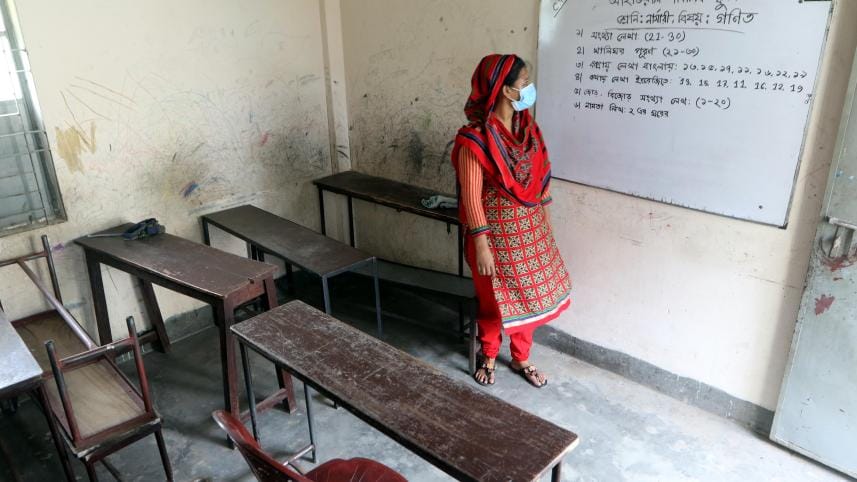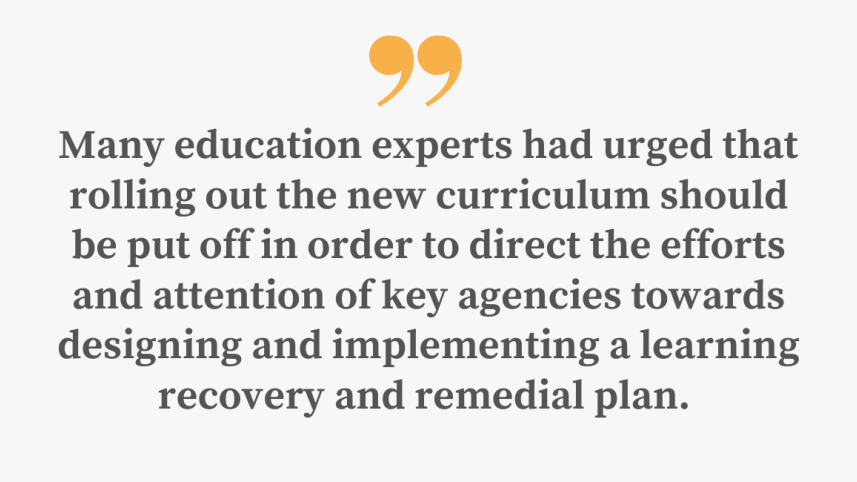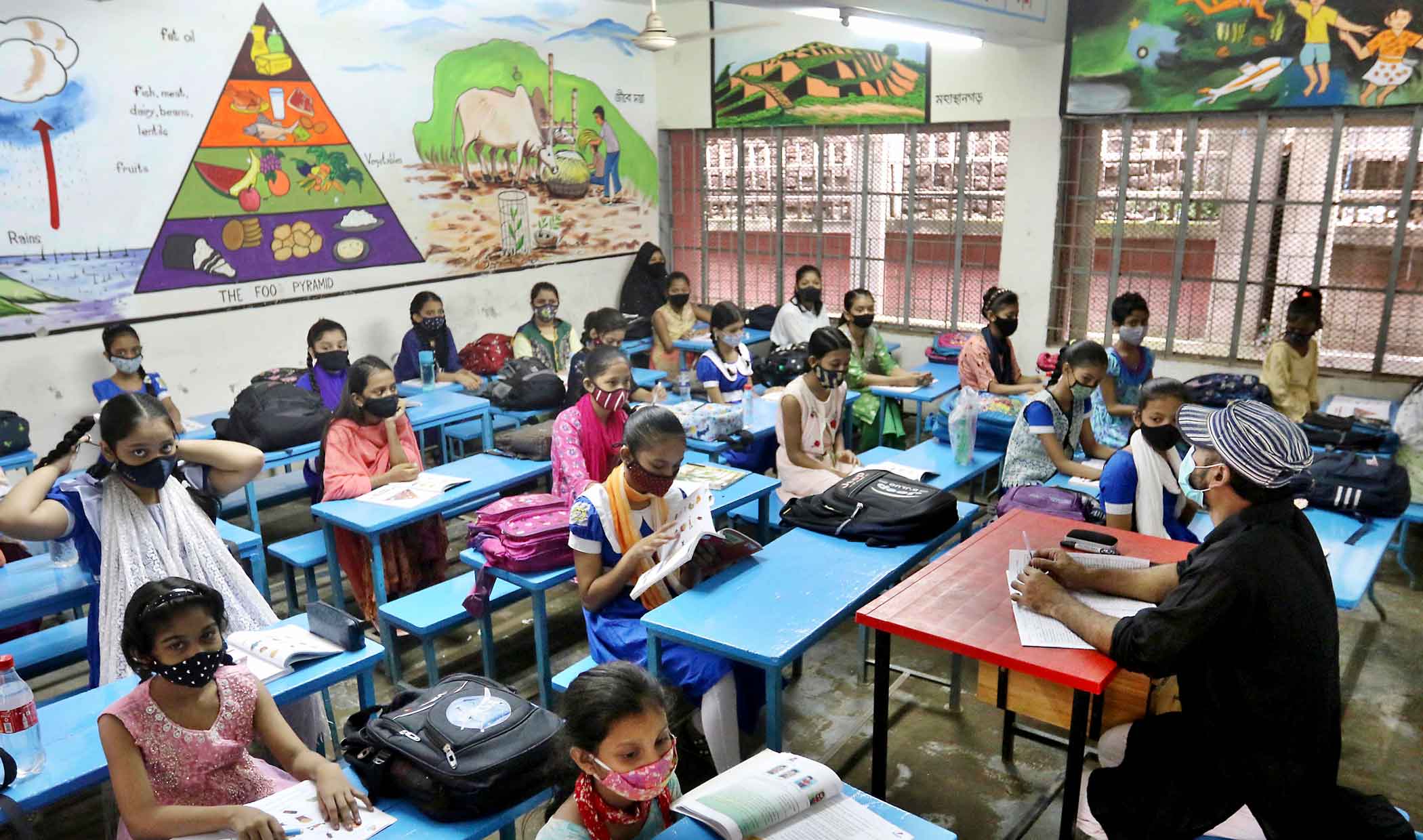‘New year, new curriculum’ cannot transform our school education

Throughout 2022, education authorities focused on returning to a "normal" routine, making minimal adjustments mostly in organising public examinations. But now, we are paying a price for ignoring the depth and breadth of the problems that exist in our education system.
Many educators had argued last year and at the beginning of this year for adopting a recovery and remedial plan of two to three years to make up for the learning loss from the long pandemic-induced school closure. The advice was largely ignored. Policymakers seemed uninterested in an objective reckoning of causes and consequences.
Educators had advised to: a) carry out a rapid assessment in each primary school on students' readiness for their grade level in basic skills of Bangla and maths, and science and English at the secondary level, b) extend the current school year to next June and help students be prepared for their grade in core skills (and take this opportunity to also switch the school year period to September-June permanently, which is justifiable by the climate pattern of Bangladesh), c) help teachers with guidance, online support, and incentives to carry out remedial work for their students, and d) shift the emphasis from public and school exams to improving teaching-learning to recover learning loss.
The authorities, in response, suspended the primary completion and junior secondary public exams – a welcome move that was being demanded even before the pandemic.
However, the HSC exam in 2021 was also suspended and the SSC exam was conducted for some optional subjects, leaving out core subjects such as languages and science. These were controversial decisions.
In 2022, SSC and HSC exams were held based on an abridged syllabus. The logic behind this, apparently, was to go back to the pre-Covid school routine as soon as possible. But the need to specify what lessons students would be tested on points to a basic problem of public exams, which require students to memorise answers and depend on private tutors and guidebooks.
The alternative could be to test basic competencies in languages, maths, and science that students are expected to acquire at the secondary school stage without referring to detailed lesson contents in textbooks. The latter should be an element of classroom lessons and tested there and then by teachers on a regular basis.
But education authorities' response was dictated by their need to maintain, above all, the public exam timetable. Not much attention was exerted on designing and implementing a recovery and remedial plan. There was also a tendency to underestimate the many negative effects of the pandemic – social, emotional, health-related, and economic – that affected children's ability to participate in education. This is manifested in the increased number of child marriages, increased child labour and higher rate of school dropouts.

The two education ministries and the National Curriculum and Textbook Board (NCTB) have been working on rolling out a revision of the school curriculum, which was last updated in 2012. The syllabus and textbooks based on the new curriculum were expected to be tried out in 2021. Due to the school closure, of course, this was put off. Still, use of the revised textbooks has started on a small scale at the secondary level this year, and a similar piloting is expected for the primary level in 2023.
Many education experts had urged that rolling out the new curriculum should be put off in order to direct the efforts and attention of key agencies towards designing and implementing a learning recovery and remedial plan. These agencies, currently busy with the new curriculum, are the NCTB, the National Academy for Primary Education (NAPE), the National Academy of Educational Administration and Management (NAEM), and the education boards and directorates.
Educationists have argued that the critical need of the hour is to work on learning loss recovery rather than introducing new changes to educational content and pedagogy. They opine that the main weakness of our schools is the absence of effective teaching and learning in the classrooms, mainly due to teachers' weak professional skills and lack of capabilities and motivation, as well as the subpar working conditions of schools. Rewriting the curricula and textbooks can make little difference in tackling these foundational issues.
In fact, the 2012 curriculum could not be implemented in classrooms because of the weaknesses mentioned above. What assurance is there that the new curriculum would be better implemented? Education experts were of the view that a recovery plan, bringing at least the majority of the students up to their respective grade levels, would help create the conditions for implementing a reformed curriculum in schools and better prepare teachers for their tasks.
What has been seen of the new curriculum so far suggests that the concerns about going ahead with it at this time are not unfounded. Prof Siddiqur Rahman, who was at the lead for preparing and introducing the 2012 curriculum, writes, "It is good to be ambitious, but being ambitious beyond limits that cannot be realised is mere extravagance" (Bangladesh Protidin, November 2, 2022).
Rahman writes that a "paradigm shift" is claimed for the new curriculum but, except for rhetoric, what this means in practice is not quite clear.
Experiential learning is the buzzword used when describing the curriculum. This is a common objective and a term used often in describing a school curriculum. But will teachers' skills, the classroom environment, and the student-teacher ratio make it possible to put the right pedagogy into practice?
Training teachers for a few weeks cannot remove the many prevailing obstacles. Ideas about activities, projects, and student engagement existed in the 2012 curriculum, but very few of those found their way into classrooms, according to Prof Rahman.
Particularly problematic, as per experts, is the way school-based assessment of students is to be linked to public exam scores, with 40 to 60 percent of public exam marks to be determined by classroom assessment. Can teachers and schools be relied on to implement this fairly, at present? And are enough of them technically capable of doing so?
School-based formative assessment as part of teaching-learning is highly desirable, and this is the direction to go in by preparing teachers, students, and parents for this pedagogic approach. It is also important in its own right and it is not necessary to link it with public exam results.
Other populist ideas, not well-thought-out in our present context, have been proposed in the revised curriculum. One is requiring students to pick a vocational subject in secondary school – a popular solution often offered for a complex problem, but there is no good evidence that it works. The number of separate subjects and the curriculum burden are about the same as before. Though the necessity of these have been questioned and possibilities for re-alignment have been suggested, these are not reflected in the new curriculum.
I want to underscore that forming an ambitious and theoretically ideal curriculum will not transform our school education. Preparing teachers and creating thriving conditions for them in schools will. Forming a good recovery plan for school education and implementing it well is likely to prepare the ground for moving towards achieving the objectives of the new curriculum. Not doing so will land us in a bigger conundrum in 2023 and beyond.
Dr Manzoor Ahmed is professor emeritus at Brac University, chair of Bangladesh ECD Network (BEN) and vice-chair of Campaign for Popular Education (CAMPE).




 For all latest news, follow The Daily Star's Google News channel.
For all latest news, follow The Daily Star's Google News channel. 

Comments